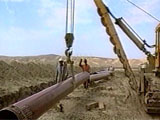|
|
TODAY.AZ / Business
Azeri crude to slip out of Russia's stranglehold
07 July 2006 [01:51] - TODAY.AZ

According to Reuters, the $4 billion pipeline, due to be inaugurated next week, will pump from 300,000 to 400,000 barrels per day of Azeri crude to Turkey's Ceyhan port and international markets by the end of this year, rising to a million bpd in 2008.
It is the first time large volumes of crude will be exported from the Caspian oil producing region of Azerbaijan, Kazakhstan and Turkmenistan without going through northern neighbor Russia.
"Baku-Ceyhan does not break Russia's stranglehold," said Alfa Bank's Moscow-based chief strategist Chris Weafer.
"What was much more important were the projects coming behind it. But they haven't happened. The big prize now that the major oil companies are after is the line from Kazakhstan."
Exports from the emerging energy giant of Kazakhstan are mostly via Russia to the Black Sea through the Caspian Pipeline Consortium.
Russia has repeatedly blocked Kazakh plans to double the Caspian Pipeline's capacity from the current 700,000 bpd, claiming it would put further strain on the congested Turkish Straits.
Expansion of the Caspian Pipeline is vital for Kazakhstan, which hopes to triple its oil output to over 3 million bpd by 2015.
Looking for an alternative, the Kazakhs joined the Baku-Ceyhan project in mid-June.
The most direct connection would be a pipeline under the Caspian from Kazakh fields to Baku. But that option is out of the question without permission from Russia, Iran and Turkmenistan. Environmental groups also oppose the pipeline.
"The Russians and the Iranians are going to do all they can to block something like that," said analyst Julian Lee at the Centre for Global Energy Studies.
"It is very difficult given the disagreements we have over Caspian Sea ownership."
For now, oil companies operating in Kazakhstan are planning to build new terminals on either side of the Caspian and use tankers to ship Kazakh crude across the sea.
Lee said he doubted the region had the shipyard capacity to build the tankers needed for large volumes to move that way. Large-scale Kazakh exports through the Baku-Ceyhan line were unlikely before 2010, Kazakh's energy minister said last week.
The U.S. gave heavy political support to the Baku-Ceyhan pipeline as it sought to counter Russia's control over the region, diversify its own crude supply and lessen its growing dependency on Middle Eastern oil.
"From a diplomatic point of view for the West it makes a lot of sense," said Frank Verrastro, director of the energy program at the Washington-based Center for Strategic and International Studies. "It's non-OPEC, non Persian Gulf oil and the transit route is outside of Russia."
The 1770 km pipeline also avoids the Turkish straits, where crude carriers can be subject to long delays during winter.
But some analysts question how much more reliable Azerbaijan is in the long term than any other exporter.
"From my point of view I'm not sure that Azeri crude is really any more reliable than Russian crude," said Carl Calabro, director of market analysis at PFC Energy. "The Azeris have problems with Armenia and the Turks have problems in eastern Turkey."
/www.themoscowtimes.com/
URL: http://www.today.az/news/business/27945.html
 Print version
Print version
Connect with us. Get latest news and updates.
See Also
- 03 April 2025 [13:26]
Over 45 billion cubic meters of gas supplied to Europe via TAP, energy minister - 03 April 2025 [13:13]
AZAL successfully completes first quarter of 2025 with strong operational performance - 03 April 2025 [11:46]
Asian Development Bank approves $225,000 for Baku Metro expansion support - 03 April 2025 [11:21]
COP29 achievements highlighted at Petersburg Climate Dialogue - 01 April 2025 [12:28]
"E-Polis" introduces convenient online payment for state fees - 01 April 2025 [12:04]
Israel gains approval to export fresh fruits to Azerbaijan - 30 March 2025 [20:39]
Photo contest "Agriculture in Azerbaijan" underway - 30 March 2025 [17:15]
Nearly 900,000 pensions, allowances, and scholarships appointed proactively - 28 March 2025 [10:22]
World Bank approves Azerbaijan’s AZURE renewable energy expansion project - 28 March 2025 [10:00]
Azeri Light oil price drops
Most Popular
 Man with a "small brain" – Adam Schiff will not find it enough
Man with a "small brain" – Adam Schiff will not find it enough
 Armenia on the verge of economic collapse - sanctions fraud failed
Armenia on the verge of economic collapse - sanctions fraud failed
 Iranian presidential adviser visits Azerbaijan for high-level talks
Iranian presidential adviser visits Azerbaijan for high-level talks
 Azerbaijanis in Europe protest for justice at Hague’s Peace palace
Azerbaijanis in Europe protest for justice at Hague’s Peace palace
 Armenian populists offended by the nickname "populists"
Armenian populists offended by the nickname "populists"
 PLA launches exercises near Taiwan island
PLA launches exercises near Taiwan island
 British MP honors Azerbaijani Genocide Day in Parliament on March 31st
British MP honors Azerbaijani Genocide Day in Parliament on March 31st
